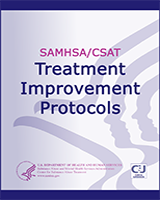NCBI Bookshelf. A service of the National Library of Medicine, National Institutes of Health.
Center for Substance Abuse Treatment. Substance Abuse Treatment and Domestic Violence. Rockville (MD): Substance Abuse and Mental Health Services Administration (US); 1997. (Treatment Improvement Protocol (TIP) Series, No. 25.)
Treatment Improvement Protocols (TIPs) are best practice guidelines for the treatment of substance abuse, provided as a service of the Substance Abuse and Mental Health Service Administration's Center for Substance Abuse Treatment (CSAT). CSAT's Office of Evaluation, Scientific Analysis, and Synthesis draws on the experience and knowledge of clinical, research, and administrative experts to produce the TIPs, which are distributed to a growing number of facilities and individuals across the country. The audience for the TIPs is expanding beyond public and private substance abuse treatment facilities as alcohol and other drug disorders are increasingly recognized as a major problem.
The TIPs Editorial Advisory Board, a distinguished group of substance abuse experts and professionals in such related fields as primary care, mental health, and social services, works with the State Alcohol and Other Drug Abuse Directors to generate topics for the TIPs based on the field's current needs for information and guidance.
After selecting a topic, CSAT invites staff from pertinent Federal agencies and national organizations to a Resource Panel that recommends specific areas of focus as well as resources that should be considered in developing the content for the TIP. Then recommendations are communicated to a Consensus Panel composed of non-Federal experts on the topic who have been nominated by their peers. This Panel participates in a series of discussions; the information and recommendations on which they reach consensus form the foundation of the TIP. The members of each Consensus Panel represent substance abuse treatment programs, hospitals, community health centers, counseling programs, criminal justice and child welfare agencies, and private practitioners. A Panel Chair (or Co-Chairs) ensures that the guidelines mirror the results of the group's collaboration.
A large and diverse group of experts closely reviews the draft document. Once the changes recommended by these field reviewers have been incorporated, the TIP is prepared for publication, in print and online. The TIPs can be accessed via the Internet on the National Library of Medicine's HSTAT home page at the URL: http://text.nlm.nih.gov. The move to electronic media also means that the TIPs can be updated more easily so they continue to provide the field with state-of-the-art information.
While each TIP strives to include an evidence base for the practices it recommends, CSAT recognizes that the field of substance abuse treatment is evolving, and research frequently lags behind the innovations pioneered in the field. A major goal of each TIP is to convey "front-line" information quickly but responsibly. For this reason, recommendations proffered in the TIP are attributed to either Panelists' clinical experience or the literature. If there is research to support a particular approach, citations are provided.
This TIP, Substance Abuse Treatment and Domestic Violence, presents treatment providers with an introduction to the field of domestic violence. It gives providers useful information on the role of substance abuse in domestic violence—both among the men who batter and the women who are battered. Useful techniques for detecting and eliciting such information are supplied, along with ways to modify treatment to ensure victims' safety and to stop the cycle of violence in both parties' lives. Legal issues, including duty to warn and confidentiality, are discussed. Finally, the Panel provides a blueprint for a more integrated system of care that would enhance treatment for both problems. This section includes practical suggestions for establishing linkages both between substance abuse treatment providers and domestic violence support workers and with legal, health care, criminal justice, and other relevant service agencies.
Other TIPs may be ordered by contacting The National Clearinghouse for Alcohol and Drug Information (NCADI), (800) 729-6686 or (301) 468-2600; TDD (for hearing impaired), (800) 487-4889.
- What Is a TIP? - Substance Abuse Treatment and Domestic ViolenceWhat Is a TIP? - Substance Abuse Treatment and Domestic Violence
- BioProject Links for Nucleotide (Select 2732744938) (1)BioProject
Your browsing activity is empty.
Activity recording is turned off.
See more...
